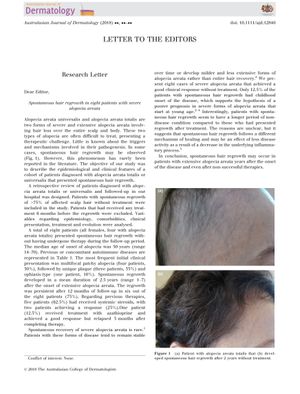Spontaneous Hair Regrowth in Eight Patients with Severe Alopecia Areata
June 2018
in “
Australasian journal of dermatology
”

TLDR Eight people with severe hair loss grew their hair back naturally.
The document reported on eight patients with severe alopecia areata who experienced spontaneous hair regrowth. This observation was significant as it highlighted the potential for natural recovery in cases of severe hair loss without medical intervention. The study was conducted by a team from the Dermatology Department at Ramón y Cajal Hospital in Madrid, Spain. The findings suggested that even in severe cases, there might be an inherent capacity for hair regrowth, which could influence future approaches to treatment and patient management.

